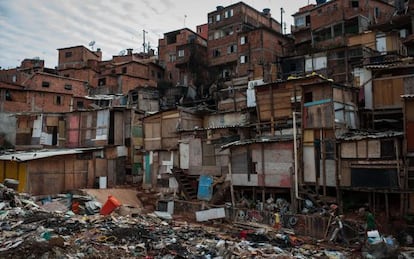A Brazilian criminal organization attempts to enter politics
The mafia group operates inside prisons


An investigation from the Office of the Public Prosecutor in São Paulo has revealed new criminal activities by 175 members of Primer Comando de la Capital (PCC), the organized crime organization that operates inside prisons in 22 states throughout the country. This operation is considered one of the most important in the history of organized crime. It has brought together thousands of documents and audio files. It is a veritable and unprecedented X-ray of the PCC's complex network which has paralyzed São Paulo and spread panic among its residents on various occasions.
According to the newspaper O Estado de São Paulo, the Office of the Public Prosecutor has discovered evidence of crimes committed by the PCC. From their prison cells - including some maximum security facilities - the leaders of the organization give orders for assassinations, and for arms and cocaine purchases to their henchmen on the streets. They also decide when attacks should be carried out against police officers and politicians.
What may be more alarming is the fact that the PCC was planning on entering politics by backing candidates for Congress and for posts in the provincial governments. This organization not only operates in Brazil. Its members are also found in Bolivia and Paraguay. In São Paulo it rules in 90 percent of the prisons and it brings in about eight million reales per month from drug sales and another two million from lotteries and voluntary contributions from ex-convicts on the streets (a total of 4.6 million dollars).
Annual revenues reach 120 million reales or 60 million dollars, which puts the PCC in the top 1.150 businesses in the country, O Estado reported. Its main enterprise is the sale of drugs in hundreds of locations around the country. Its merchandise comes from Paraguay and Bolivia.
The PCC also has an arms arsenal -more than 100 rifles and seven million reales buried in seven PCC-owned apartments. The organization has 6,000 members in prisons and 1,600 on the streets just in São Paulo alone. There are 3,582 members in other states.
According to thousands of phone conversations intercepted by the police, the PCC bribes civilians and military personnel. It even has a Board of Directors and its own statutes. The board oversees the activities "on the street."
The PCC has also been involved in political maneuvers. It has organized actions to help or block politicians during election campaigns. On the whole the organization tries to create chaos in the cities when it disapproves of the candidates. They tend to be those who are labeled "right-wingers."
The formal charges were signed by 23 São Paulo judicial authorities who called for the detention of 112 of the accused to prevent flights. The prosecution, however, has refused to order the imprisonment of the accused saying that decision requires a "more in-depth analysis".
Translation: Dyane Jean François







































